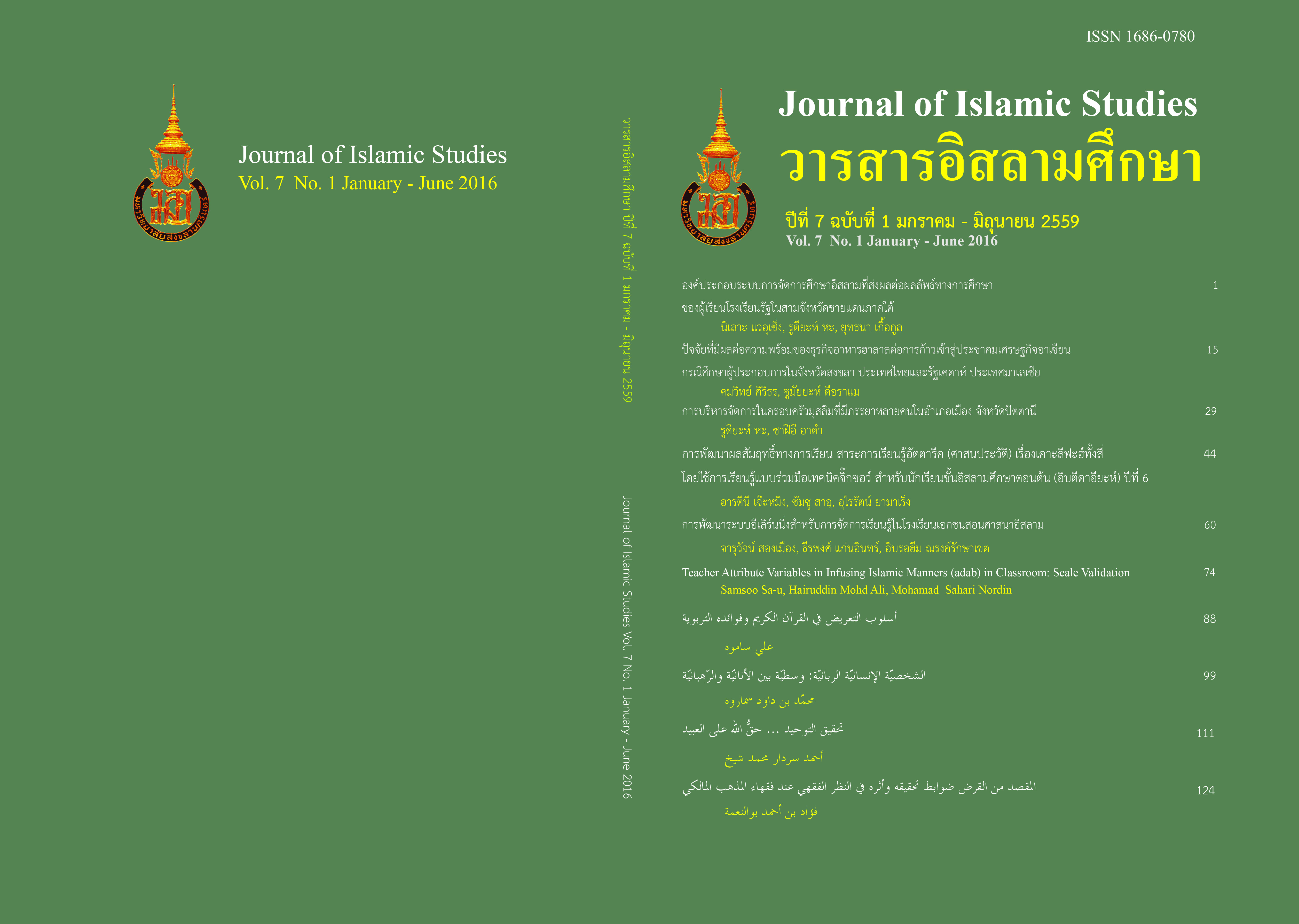The Administration and Management of Muslims’ Polygamy Family in Muang District Pattani Province
Keywords:
Polygamy, Management, Muslim’s FamilyAbstract
This research aims to examine the administration and management in the Muslims’ polygamy family and to study the problems and conditions that affect the management of the Muslims’ polygamy family. The research was conducted by using a qualitative methodology. and the data were obtained from the case study of a Muslim’s family in Muang District, Pattani Province numbering about 10 numbers. The data were collected through the in-depth interview, observations and relationship building. The researcher analyzed the data by interpreting meaning of the data and using a computer program ATLAS.ti to assist in data analysis. The research found that the management in the Muslim’s Polygamy Family includes 1) Treating the wives and children fairly, 2) Relationship building among family’s members, 3) Teaching of religious knowledge, 4) Emphasizing the upbringing of children, 5) Managing conflict within the family, and 6) Managing emotion and stress. The problems faced which affected the management of the polygamous Muslim family can be divided into: 1) The problems caused by the insiders which include, experience of stress during the period of adjustment, the husband is lacking preparation in giving understanding to the first wife and lastly the difficulties in economic issues, 2) The problems caused by the outsiders which include the parents of his wife who did not accept that status, the incorrect understanding of people around his wife, by in the same society, and lastly the impact of the social media. The contextual conditions still affect the management of the families, at the individual level some of husbands, wives and also other Muslims still misunderstand about the concept of polygamy in Islam. And at the social level there should be a program giving the correct Islamic knowledge to Muslim society in order to apply this provision in conformity with the condition of context.
References
สมาคมนักเรียนเก่าอาหรับ ประเทศไทย. (2542). พระมหาคัมภีร์อัลกุรอานพร้อมความหมายภาษาไทย. อัลมะดีนะฮฺอัลมุเนาวะเราฮฺ: ศูนย์กษัตริย์ฟาฮัด เพื่อการพิมพ์อัลกุรอาน
สุภางค์ จันทวานิช. (2546). วิธีการวิจัยเชิงคุณภาพ. กรุงเทพมหานคร : สำนักพิมพ์แห่งจุฬาลงกรณ์ มหาวิทยาลัย.
Hammudah Abdalati. (1995). The Family Structure in Islam. 4th edition. United States: American Trust Publications.
Abu Ameenah Bilal Philips and Jameelah Jones. (1990). Polygamy in Islam. Riyadh : Tawheed Publications.
Mohammed bin Misfer bin Hussein At-Towil. (2004). Ta’addud al-Zaujātfī al-Islām
(تعدد الزوجات في الإسلام ) Maktabah Miskāt al-Islamiyah.
Muhammad Imron. (2000). Ideal Woman in Islam. Pakistan: Islamic Publications (Pvt) Ltd. Limited.
S.M. Madani Abbasi. (1995). Family of the Holy Prophet. : Adam Publishers and Distributer.
Omar M. Khasawneh, Abdul Hakeem Yacin Hijazi and Nassmat Hasan Salman. (nd.) Polygamy and Its Impact on the Upbringing of Children: A Jordan Perspective. Educational Administration and Foundations, College of Education, Yarmouk University.Irbid. Jordan.
S.Elbesdour, William Bart and Joel Hektner. (2007). The relationship between monogamous/polygamous family structure and the mental health of Bedouin Arab adolescents. Department of Human Development and Psychoeducational Studies, School of Education, Howard University.
DhinarKamesworo. (2011). Persepsi Perempuan Tentang Poligami yang Dilakukan Para Tokoh Agama Islam “Ustadadz”.Fakultas Ilmu Sosial dan Ilmu Politik. Universitas Pembangunan Nasional “Veteran” JawaTimur. Indonesia
อับดุลสุโก ดินอะ. (2553). อนาคตกฎหมายอิสลามในประเทศไทย The Future of Islamic Law in Thailand.http://www.oknation.net/blog/print.php?id=57895 สืบค้นเมื่อวันที่ 17/12/2554
Radiafisha Anastri. (nd). Self Acceptanccein Teenagers Who Have Polygamy Parents. Gunadarma University Library : http:// library.gunadarma.ac.id – สืบค้นวันที่ 3/3 2555
Ardian Didik. (2009). http://publikasi.umy.ac.id/index.php/komunikasi/article/ สืบค้นเมื่อวันที่ 20 /2/2555
Downloads
Published
How to Cite
Issue
Section
License
All articles Published in The Journal of Islamic Studies are author’s opinions, and not the responsibility of the Faculty of Islamic Sciences nor the editorial board. However any citation should be referred to the journal.


